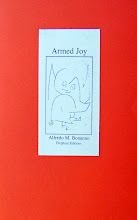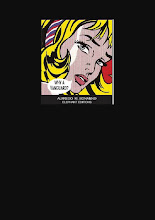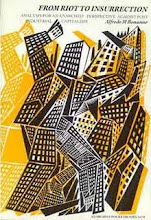A little black thing in the snow,
Crying "weep! weep!" in notes of woe!
"Where are thy father and mother? Say!"
"They are both gone up to the church to pray.
"Because I was happy upon the heath,
And smiled among the winter's snow,
They clothed me in the clothes of death,
And taught me to sing the notes of woe.
And because I am happy and dance and sing,
They think they have done me no injury,
And are gone to praise God and his priest and king,
Who make up a heaven of our misery."
William Blake
Many comrades produce solidarity like tramps produce lice. They do so in great quantity, in every way, towards all those needy of tokens of solidarity: the persecuted, the oppressed, the meek, the disabled, towards all those who have been or are about to be deprived of something.
It’s not true that giving solidarity is cheap, as some malicious minds would have it, saying it in whispers of course. On the contrary it has a price, it costs a lot, it costs in terms of effort, early rising (a little) to get to the physical places where the abuse is committed, late nights (many) passed discussing how to organise oneself in the most opportune way to assist and help every kind of needy person.
Revolutionaries with the candid souls of Clarissa nuns in nurses’ uniforms gradually wither away, growing old and fat in the shadow of these assistential procedures without deflecting an instant. Now one can see them day and night attached to their cell phones in conversation with other social workers of every species to better produce solidarity, uninterruptedly, without perplexity, without any doubt. The specialisation does not dishearten them, on the contrary it reconfirms their lives.
Life, seen as a whole, and therefore in a reduced and simply paradigmatic framework, oscillates between doing and acting. The first position is stable, temporalised, garantor of a certain albeit incomplete consciousness, gratifying, even if in the long run it produces habituation to stupidity. The second is uncertain, provisional, clear of stable and prefixed positions; it is fragmentary and discontinuous, happens and makes happen in a non temporal point.
Now, for a long time – even too long – we have been asking ourselves what we should mean by solidarity. A declaration of intent? A recognition of the situation of distress in which someone is to be found? A communiqué concerning the repressive organs that the object of repression is not alone but finds at his side ourselves, trained combatants devoid of common goals but all ears in picking up every rise of the truncheon?
I understand that some comrade can find himself in the objective and circumscribed situation of being faced with specific repressive situations that touch the heart. I also understand that many comrades of a tender heart almost, almost draw these situations upon themselves like magnets, operating if not exactly life choices at least a choice of field.
But revolutionary solidarity is something else.
Let us try, for the nth time, to clarify the problem.
I think, for the sake of argument, that it is possible to hypothesize two situations: solidarity that I mean to give to the excluded in general and that which I intend to give to the comrades struck by the repression. It might seem like the same thing but it is not. Concerning the first I can denounce the repressive processes but my primary aim cannot stop there, it must go beyond that, I must, that is, try to organise the excluded in question to realise along with them an attack against the instruments and men that this repression realises. Concerning the second, my revolutionary solidarity can only consist in continuing the revolutionary project for which the comrades were struck by the repression.
It is clear that in both cases the initial moment of the solidarity is only a passage, even pleonastic if not merely secondary, to moving to a successive moment. In the case of the excluded in general it has the aim, not as an end in itself, of making myself known to present the organisational project, this, yes, of a revolutionary nature. In the case of the comrades simple solidarity is almost counterproductive if my real aim remains that of continuing their project, because it could jeopardise precisely this continuation, making publicly known a sharing of intent that it is not always useful to bring to the attention of repression. It goes without saying that if I do not agree with the project of the comrades under attack by the repression I am not prepared to give them my solidarity at all, which would merely be a banal manifestation of my existence (here I am: I’m here, I exist too) and would have nothing revolutionary about it.
For many, contrary to what is suddenly being exposed here, solidarity is a convenient drawer in which to store one’s daily misery. In this way, being in solidarity with whoever ends up in prison (Stalinists included) becomes a sport to be carried out full time, with the worthy result of feeling oneself alive and useful in some way.
Improbable musical groups, frequenters of taverns, Sunday picnickers, meet up with rhythms worthy of greater things and assist all those who raise a hand to ask for help: prisoners and migrants in the first place, these two sectors are practically inexhaustible.
And so on.
original title: Solidarieta come attestazione in vita
senzaTitolo n.4
skip to main |
skip to sidebar

Some writings of Alfredo Maria Bonanno in English, or almost

Alfredo Bonanno was arrested on October 1st 2009 in Greece, accused of concourse in robbery. With him, anarchist comrade Christos Stratigopoulos.
Here are a few translations and part translations of a small portion of Alfredo's writing. This is a work in progress, many of the translations are as yet incomplete. Open links to find more of Alfredo's work.
Alfredo Bonnano Released
Nov. 22 Alfredo Bonnano was sentenced to 4 years imprisonment (which practically means that with the time served so far and the fact that he is over 70years old HE IS RELEASED
Christos Stratigopoulos (who took responsibility for the action)
was sentenced to 8 years and 9 months with the Greek law will probably be released at the end 2011
BY ANY MEANS NECESSARY
LINKS
click on any of these labels to read text
- "Community" sickness
- 1981 - Editorial
- A Critique of Syndicalist Methods
- A few notes on Sacco and Vanzetti
- A few notes on the revolutionary movement in Italy
- A little man in Singapore
- A million jobs
- A question of class
- Affinity
- After Marx autonomy
- Albania Laboratory of Subversion (Introduction)
- Anarchism and the national liberation struggle
- Anarchists and action
- AND WE WILL ALWAYS BE READY TO STORM THE HEAVENS AGAIN (Against amnesty)
- ANTI-INSTITUTIONAL MOVEMENT
- Are we modern?
- Armed Joy
- ARMED STRUGGLE. SOME REFLECTIONS.
- Autonomous base nuclei
- beyond syndicalism
- Beyond workerism
- But what is the imaginary?
- Class War
- Comiso - Organizational document of the self-managed leagues
- Considerations on illegality
- Dissonances (Introduction)
- Elephant Editions 1986
- Excluded and included
- Farewell to claiming
- Feral Revolution (Introduction)
- FICTITIOUS MOVEMENT AND REAL MOVEMENT
- For an Antiauthoritarian Insurrectionist International - Proposal for a debate
- From riot to insurrection
- From the centre to the periphery
- Good technology
- Guerilla Extraordinary
- Habits and idols
- Hegel
- I know who killed chief superintendent Luigi Calabresi
- Illegality
- Illness and capital
- Informal organisation
- Insurrection
- Internationalism
- Introduction to Sabate
- Introduction to Anarchism and Violence
- Introduction to Bratach Dubh English edition of Malatesta's Fra Contadini
- Introduction to Insurrectionalist Anarchism
- Introduction to Strange Victories
- Introduction to The Conquest of Bread
- Involuntary aspects of voluntary work
- Let's destroy work
- LET'S DESTROY WORK. New introduction
- Let's keep our feet on the ground please
- Lightening Conductors and Stand-ins - more shots of non-news
- Lightning Conductors and Stand-ins
- Lightning Conductors and Stand-ins (cont.)
- Locked up
- Looking forward to self-management
- Loss of language
- More on internationalism
- National Liberation Struggle
- nineteen years on
- No more crises
- Non-news about drugs
- Non-news about racism
- Ode to the Uniform
- On Feminism
- One's life on the line
- Order and chaos
- Otto Ruhle (Introductory Note)
- OUR ROLE IN THE PRESENT CONFLICT
- Palestine mon amour
- Pantagruel anarchist review
- Pinelli
- Prison and Prisoners’ Struggles - Introduction
- Propulsive Utopia
- Quality and the factory
- Restructuring Capital and the new democracy
- Revolution - Violence - Antiauthoritarianism
- REVOLUTIONARY VIOLENCE
- Science and the social revolution
- Self-management
- Severino Di Giovanni in Argentina 1923-1931 by Osvaldo Bayer
- Social banditry
- SOME NOTES -
- Space and Capital
- Stirner
- Stop the City? From information to attack
- Strategy and Methods
- Streamlined production
- The "end" of the crisis
- The aesthetics of anarchism
- The anarchist tension
- The area of autonomy and the anarchist movement in Italy
- The armed wing of science
- The Cruise missile base at Comiso can be prevented
- The ethical bank
- The insurrectional project
- THE LANGUAGE OF TECNICS -
- The logic of insurrection
- The moral split
- THE NECESSARY DESTRUCTION -
- The priority of practice
- The refusal of arms
- The revolutionary project
- The revolutionary struggle
- The significance of an insignificant event
- The struggle for self-managed social space
- The tyranny of weakness
- The whole and the part
- The young in a post industrial society
- Theory and action
- Towards anarchist antimilitarism
- TOWARDS THE GENERALISATION OF ARMED STRUGGLE
- TRANSFORMATION IN THE WORLD OF WORK AND SCHOOL -
- TRUTH -
- Unemployment in Italy - How come everything doesn't explode?
- Untitled
- Violence and non-violence
- What are anarchists
- What can we do with anti-fascism?
- Why a vanguard?
- Why Insurrection
- World domination in a few words











